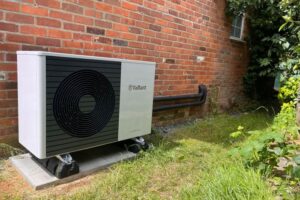
Heat Pump Satisfaction Survey Demonstrates Growing Appeal
A comprehensive survey of heat pump users in May 2023 revealed a satisfaction rating of more than 80% among households that have switched from gas boilers to electric-powered heat pumps.
The survey was carried out by Eunomia Research and Consulting on behalf of innovation charity Nesta. It considers the experiences of 2,549 domestic heat pump owners and more than 1,025 domestic gas boiler owners across England, Scotland, and Wales during the preceding winter. To date, it’s the largest study of its kind.
The findings allay a number of fears, the chief of which is that heat pumps are less effective than their gas boiler counterparts. The survey also makes it clear that property types have little or no bearing on consumer satisfaction vis-à-vis heat pump efficiency. Whether installations took place in a new build or a Victorian (or older) property, an 83% satisfaction rating was recorded.
This rather puts to bed the misconception that heat-pump effectiveness only applies to modern buildings, or those that have had substantial energy-efficiency upgrades.
With 81% of households expressing satisfaction equal to or surpassing previous heating systems (including gas, oil, and LPG boilers), the survey’s findings signal an overwhelmingly positive consumer reception to heat pump technology.
Madeleine Gabriel, Sustainable Future Director at Nesta, feels the survey’s results should banish “outdated” misgivings surrounding low-carbon heating technology. And she calls on the government to intensify its efforts in phasing out fossil-fuel heating, emphasising the need for a reliance on cleaner, greener alternatives such as heat pumps. (Thus far, the government has pledged to have 600,000 heat pumps installed annually as part of its carbon-emission-reduction initiatives.)
Running costs are another common heat-pump-related concern, to which the survey reveals that 66% of heat pump owners who didn’t undertake extensive energy efficiency upgrades expressed satisfaction. It’s a key point of the findings as it scotches the myth that successful heat pump installation can only occur if other energy-saving measures are implemented.
The survey highlights that while installations are sometimes accompanied by additional upgrade work, it’s not as common as many may think. Indeed, according to the survey, roughly 36% of heat pump customers undertook loft insulation, while 23% opted for wall insulation or additional window glazing, and only 14% chose to carry out multiple measures.
Certainly, when it comes to the installation of the technology, it’s clear that homeowners are fluid in how they go about it.
Clem Cowton, Director of External Affairs at Octopus Energy, sees a direct correlation between the “astronomical demand” for heat pumps and the findings of the survey, hence an Octopus waiting list of approximately 50,000 households who’ve expressed an interest.
This raises a potential stumbling block as the heat-pump roll-out continues apace: are there sufficient trained installers and is there enough investment in the technology to meet the demand?
Cowton also considers that the survey’s positive outcome sends a message to the government, which “should now have the confidence to move forward quickly with its proposal to remove punitive levies from household electricity bills, and streamline out of date planning rules to make it easier and cheaper for everyone to make the switch to cleaner, safer and more efficient heating with a heat pump.”
Of course, we at Solaris Energy are in full accordance with Ms Cowton’s views on the matter. However, in respect of training and investment, we’re well ahead of the curve. Unlike companies such as Octopus, our sole focus is on air and ground source heat pumps, which means we’re ready and able to take on new projects in rapid quick time.